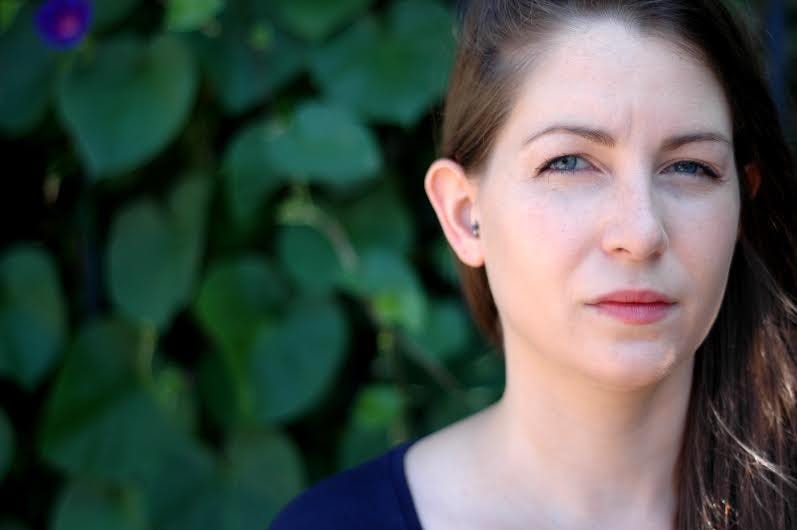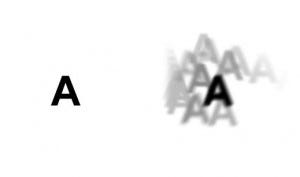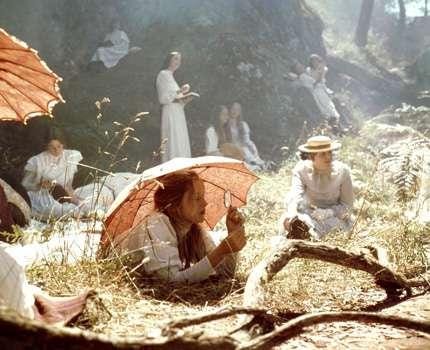interviews
INTERVIEW: Sasha Graybosch, author of “Recovery Period,” now on Recommended Reading

by Maru Pabón

This week, Recommended Reading published “Recovery Period,” an original short story by Sasha Graybosch, a writer and instructor at the Fashion Institute of Technology. Before the story’s publication, I talked with Sasha via email about the unique and personable ways she delved into difficult romantic relationships, grief, and otherworldly paradoxes.
Maru Pabón: In “Recovery Period,” Greer is afflicted with keratoconus, a disorder that causes her to see halos and starbursts around light sources. How did you approach writing about this condition? Why did you decide to give Greer a formal diagnosis?
Sasha Graybosch: When I was first putting together ideas for the story, two elements emerged in my notes: phone conversations with a person somewhere very strange and anonymous postcards. I don’t recall at what point Greer’s keratoconus was added, but I knew I needed another event or issue to triangulate the story and ground her emotional journey in something concrete. I had been wanting to write about an eye surgery and my instincts said it would fit.Years ago my mom had a corneal transplant. I remember her talking about the odd fact that she was seeing through the cornea of a recently deceased person. She told me about watching the operation unfold. The whole thing was bizarre and morbid, and sweet, too, the passing on of sight after life, a sort of resurrection, and also disgusting. It stuck with me.

There needed to be a reason for the character to have the operation, and I came across keratoconus in my research. I probably googled “eye problems.” The symptoms were fascinating. I have an affinity for writing about unusual physical and mental infirmities, and I enjoyed creating the conditions of her ailment. Placing the character in the midst of a physical disintegration opened my imagination. Greer ended up handling the chaos pretty well, from the first line I wrote, which helped me build her character. The particulars gave me the grain to grip on to climb to other parts of the story.
MP: Can you also talk about the connection between distorted vision and grief presented in the story?
SG: That was an important connection for me as I was writing. I tried not to rely too heavily on the parallel, but I did want an echo. Both distorted vision and grief are their own realities. Both are a disturbance of one’s perceptions, though what “seeing clearly” means differs. Their horror comes from a loss of control, and both are isolating.
In grief you know on some level that the world hasn’t changed, only a tiny part of it, the loss of a person, and yet that assertion is also ridiculous because everything has changed. You’re sitting on the couch, you’re watching a commercial for Sonic — once the most normal and mundane of experiences — and suddenly it makes no sense. The commercial is grotesque. Cheese fries-derived ecstasy is personally offensive. It doesn’t reflect your pain. It represents an alternate dimension you can’t access. Outside, people walk around, smile, go about their day, and you just think, how? Objects are wrought with meaning. You are completely alone. Which isn’t true, of course, people suffer everywhere, but you can’t see that.
On the other hand, both distorted vision and grief are so absurd they’re rife with the humor of perplexity. That’s the space I wanted to inhabit in the story. I wasn’t comfortable with straight tragedy.
Greer’s keratoconus and the communications she receives in some ways make the experience of bereavement tangible. She’s battered by intrusions. I also think the breakdown of her sight is a comfort because it prolongs her emotional recovery. She’s straddling two realities, a past that includes her life with Lucien and a future without him. It’s possible to dwell in two realities but also very painful. There’s hope in the story and maybe healing, but recovery is complex. Her vision will improve and she will learn to participate in the world, but the world she sees has changed.
MP: The relationship between Greer and Lucien is developed with attention to how they relate to parts of their own bodies, parts of each other’s bodies, but also to body parts occupying different spaces around them. I’m thinking about the art exhibit they visit, with dismembered limbs floating around, and about the date they spend eating fish eyes. Are you interested in the body’s fragmentation?
SG: That’s an interesting question, but I’m not sure what it means to be interested in fragmenting the body. The first thing that comes to mind is an ad that uses breasts to sell a car. My focus on parts is most likely an unconscious proclivity as a writer. The language I’m interested in deals with particulars, details, small gestures and how they build a whole, but perhaps not with reducing the body in particular. It could be I don’t occupy a complete body all that well and so my fiction falls that way, too.
MP: The passing of time in “Recovery Period” is fluid since you include very few dates or ages, especially after Lucien’s death and Greer’s operation. How did you maintain the continuity of the narrative while forgoing conventional markers of time?
SG: Most stories deal with layers of time, and conventional markers are handy, but I tend to avoid them. Memory whips the past in and out of the present. I think of a story as: this thing was happening for a while, and before that there was this other time, but now back in the present things are getting really weird and here’s what happens next. I tell my own stories to myself that way. Sometimes I’ll hear someone say something like, “That’s when I was visiting my aunt for three weeks in Tucson in the fall of 1991” and think, wow, that is a sentence I would never say. I’m terrible with dates.
Another response I jotted to this question was “Halimah helped me,” and I think that’s also a good answer. After the story was selected for publication, part of the editorial process with Halimah Marcus focused on forging more nods to the order of events. She suggested I clarify the timeline, especially in the opening pages, and left me to puzzle over how. I appreciate her input and I’m happy I made those changes while maintaining the original fluidity.
MP: In a similar vein, the relationship between Greer and Lucien feels incredibly intimate and complex in relation to the short length of the story. You evidently took great care in crafting these characters both as individuals and as a romantic couple. From where did you draw their personalities, mannerisms and quirks? Had you been thinking about their story for a long time?
SG: I wrote the first draft knowing little about Greer and even less about Lucien. He doesn’t even appear in that version alive. I needed time to think through their personalities once I saw what I had. I usually start from a “what if” scenario, an odd situation or conceit, write a story based on my instincts, and then in subsequent drafts I work backwards to understand the characters, what led them to that place, how their unique qualities and histories brought the events into being. I value the role of time in a story’s creation as well. I came back to this one and revised it once a year over a period of four years. I put in whatever I had in me at the moment, the scenes on the tip of my mind that day.
Lucien and Greer are composites of myself and people I know. I knew I wanted them to be somewhat difficult people, that they would be united in their familiarity with being misunderstood. And at the same time not entirely understand one another. I also liked the idea of a relationship based on a prediction — that they might believe themselves to be “good” for one another because someone else said so. Often in books and movies couples come together in an intense, defining moment of epiphany, but often people blend together and accept each other slowly, barring any major conflict, like mosses growing over a rock.
MP: In the best way possible, “Recovery Period” confounds expectations grounded in earthly, familiar logic. There’s something almost magical about the way the story unfolds, with Greer not really questioning the appearance of otherworldly paradoxes. Were you at all inspired by writers of other genres?


SG: I love stories with otherworldly paradoxes, and I’m inspired by them in all forms. In film, the work of Michael Haneke, the classics Picnic at Hanging Rock and 2001: A Space Odyssey, and even some of Errol Morris’s documentaries are examples — they construct questions without answers. Usually there’s a sense of doom that arises from the characters. Their surroundings are oppressive and yet ultimately and mysteriously self-imposed. These works open up a hole and leave it open, and you can put nothing into it or everything into it. You can carry it away and stare at it for a long time. Nabokov’s story “Signs and Symbols” and Charles Baxter’s story “Through the Safety Net” have this effect on me.
I was influenced by many writers who I wouldn’t know how to categorize, but who explore the “unreal” so as to present something true or truly felt. To name a few: Yoko Tawada, Richard Brautigan, Joy Williams, Louise Erdrich, Ralph Ellison, Trinie Dalton, Mathew Derby, George Saunders, Donald Barthelme. My tastes don’t lie in this realm of fiction exclusively, but these writers taught me to follow my imagination wherever it wants to go. I also learned from Mary Gaitskill to not get too caught up in the absurd or surreal without seeking depth and giving fair due to the darkness that lives beneath humor.
MP: As a writer, what would you say is your biggest distraction from your work, or your biggest limitation?
SG: I’m still growing as a writer and I have a lot to learn. I waver dramatically between a state of focus/confidence/energy and certainty that I have no idea what I’m doing. I’m also incredibly picky about where and when I write fiction. If I write at home I end up roasting a chicken. Coffee shops are too stimulating. Evenings are a lost cause. I can take notes and read anywhere and anytime, but recently my official writing time is strictly in the daytime at the public library, alone, caffeinated, on an empty stomach, wearing unplugged headphones. It’s ridiculous.
MP: What are some forthcoming projects for you?
SG: I’ve been writing stories for years and I’m still revising several, but I’ve turned to writing a novel. It started as a story that wouldn’t end. I’ve been amassing fragments and notes and scenes for two years, and I spent a month this summer researching a rare neurological disorder that plays an important role. Currently it’s more a web than a book, but I want to find out what it can be.









